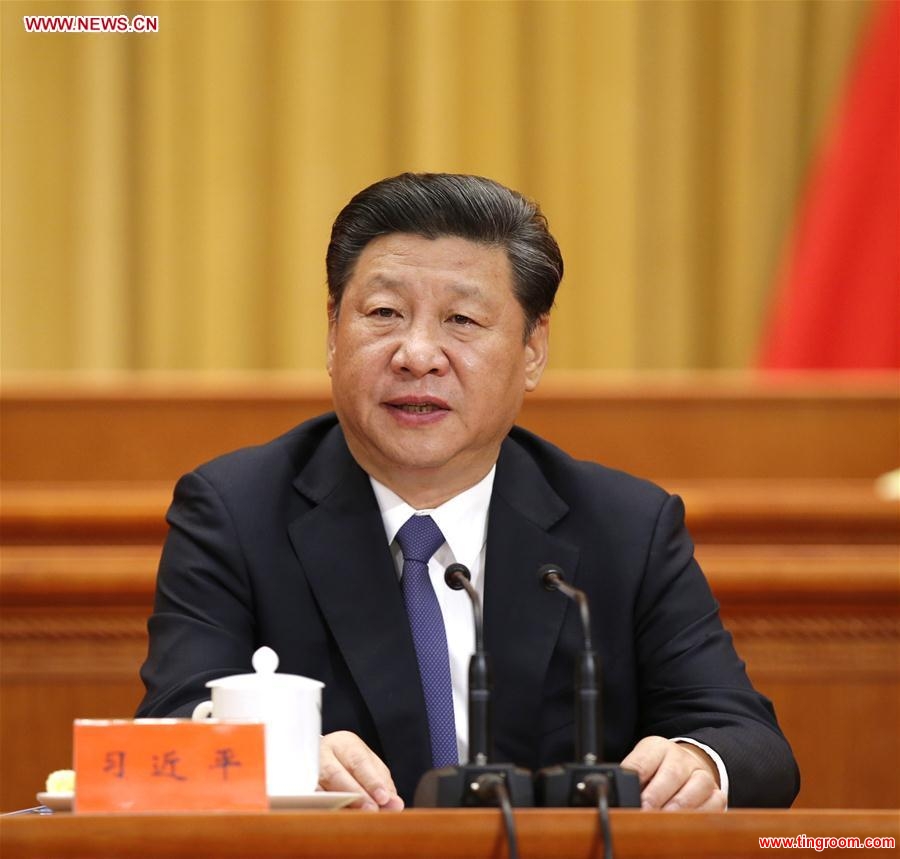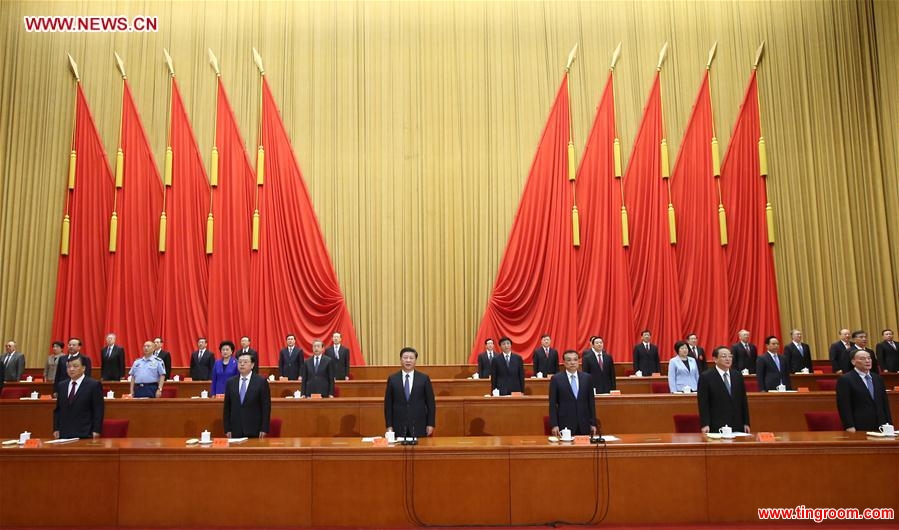CCTV9英语新闻:Xi sets China's science & technology targets
时间:2019-02-05 作者:英语课 分类:cctv9英语新闻2016年
Related reading:
BEIJING, May 30 (Xinhua) -- Chinese President Xi Jinping set the target of China becoming a leading power in science and technology (S&T) by the middle of this century as he addressed a major S&T conference on Monday.

Chinese President Xi Jinping addresses an event conflating the national conference on science and technology, the biennial conference of the country's two top think tanks, the Chinese Academy of Sciences and Chinese Academy of Engineering, and the national congress of the China Association for Science and Technology, in Beijing, capital of China, May 30, 2016. (Xinhua/Ju Peng)
China should establish itself as one of the most innovative countries by 2020 and a leading innovator by 2030 before realizing the objective of becoming a world-leading S&T power by the centenary anniversary of the founding of the People's Republic of China in 2049, Xi said.
He made the remarks at an event conflating the national conference on S&T, the biennial conference of the Chinese Academy of Sciences (CAS) and the Chinese Academy of Engineering (CAE), and the national congress of the China Association for Science and Technology (CAST).
The conference, chaired by Premier Li Keqiang, was also attended by senior leaders Zhang Dejiang, Yu Zhengsheng, Liu Yunshan and Wang Qishan.
IMPORTANCE OF INNOVATION
Xi, also general secretary of the Communist Party of China (CPC) Central Committee, stressed the role of S&T as a bedrock upon which "the country relies for its power, enterprises rely for success, and people rely for a better life."
"Great scientific and technological capacity is a must for China to be strong and for people's lives to improve," he said, calling for new ideas, designs, and strategies in science and technology.
China now ranks among the world's most advanced countries in some important fields in S&T development, Xi said.
The country is in an important transitional stage from quantity to a leap in quality, and from breakthroughs in limited areas to an improvement in overall capacity, he said.
The president hailed innovation as an important force in promoting development of a country as well as mankind.
"It won't do without innovation, nor will it do if the innovation is carried out slowly," Xi said.
"We could be thrown into an unfavorable situation and miss opportunities for development -- or miss an entire era -- if we fail to recognize changes, respond to changes and innovatively seek changes," he added.
It is "an inevitable choice" for China to implement its strategy of innovation-driven development, Xi said.
This strategy aims to ensure China's decision-making power for its own development, improve its core competitiveness, accelerate adjustment of its development pattern, solve deep-rooted problems, better guide economic development in the "new normal," and maintain sustainable and healthy economic development, Xi said.
In seeking to become a world-leading S&T power, China aims to speed up S&T innovations in all fields and seize the initiative in global S&T competition, Xi said.
PRIORITIES FOR INNOVATION
Speaking at the event, the president listed five priorities for innovation.
Stressing the priority of developing cutting-edge science and technology, Xi said China should strive to take a leading role in S&T research.
To this end, the country should have a global vision, establish development strategies in a timely manner, be confident in innovation, and be known for original theories and discoveries, he said.
Xi also called for efforts on launching key projects to create a world-class research network.
"Currently, the state needs the strategic support of science and technology more urgently than ever before," said the president.
The CPC Central Committee has outlined the nation's long-term scientific and technological strategies by the year 2030, and decided to roll out a large number of S&T projects, he noted.
He encouraged scientists and technicians to respond to the country's major strategic demands, strive to advance research into core technologies and move up to the world's S&T "high ground."
To be the world's major S&T power, the state will have to champion first-class institutes, research-oriented universities and innovation-oriented enterprises. This will also support the authoring of a substantial amount of original research, said Xi.
Moreover, the president stressed the role that scientific research plays to bolster overall economic and social development.
In the process of advancing the supply-side structural reform and implementing the tasks of cutting overcapacity and excess inventory, de-leveraging, reducing costs and addressing points of weakness, more advances in innovation are needed, Xi said.
Public S&T services should be increased, so that the people can enjoy a more livable environment, better health care and safer food and medicine, he added.
Reforming science management and operation mechanism was another priority the president listed in his speech.
He stressed that the government will try to form an energetic science management and operation mechanism through deepening reform and innovation, while continuing to better allocate resources and evaluate research findings.
Xi said the country will provide bigger support for tech companies, especially small and medium firms, and reorganize research institutes and universities.
The country also plans to create a few cities or regional centers that are attractive to outstanding innovation industries.
"Our biggest advantage is that we, as a socialist country, can pool resources in a major mission," the president said.
Xi also stressed the establishment of a rich talent pool of scientists with global vision, and entrepreneurs and technicians good at innovation.
He promised to respect the creativity of scientists and support free and bold scientific exploration.
"Scientists should be allowed to freely explore and test the bold hypotheses they put forward," Xi said.
He promised to grant leading scientists more power and liberty to decide upon the direction of their research, and greater management of research funds and resources.
The government's duty is to draw up strategies and work out plans, and enact policies and offer services, he said.
PUBLIC SCIENTIFIC LITERACY
It is also important to raise the scientific literacy of the whole of society to release the creativity of 1.3 billion Chinese, Xi said.
He urged CAS and CAE academicians to contribute their wisdom when the country is making major and long-term policies on science and technology and to set example for younger scientists.
The CAS and CAE should also play a better role as the country's premier S&T establishments, leading other institutions in the right direction.
In addition, the president urged the CAST to better serve scientists and help raise people's scientific literacy.
RESPONSES TO XI'S REMARKS
Zhou Jinfeng, a representative to the CAST national congress, said after the event, that "the conference is significant because we are at the critical juncture of realizing the 'two centenary goals', and S&T innovation is crucial to a stronger China."
The "two centenary goals" are doubling 2010 GDP and per capita income and building of a moderately prosperous society by 2020; as well as the aim to build a modern socialist country that is prosperous, strong, democratic, culturally advanced and harmonious by the middle of this century.
Chen Saijuan, a member of the CAE, said Xi voiced the concerns of scientific researchers, when he said that research grants and the S&T management regime must serve scientists.
"I believe, under the guidance of the "two centenary goals", China will gradually overcome hurdles it faces and become a world power in science and technology," said Chen.
Zhang Jinsheng, deputy head of the management committee of the Tsinghua University science park, was encouraged by Xi's saying that enterprises should play major roles in innovation decision-making, research and development, and translation of lab results into production.
"General secretary Xi's remarks sent another positive signal for promoting the country's innovation system," Zhang said.

inese President Xi Jinping (3rd L, front), Premier Li Keqiang (3rd R, front) and senior leaders Zhang Dejiang (2nd L, front), Yu Zhengsheng (2nd R, front), Liu Yunshan (1st L, front) and Wang Qishan (1st R, front) attend an event conflating the national conference on science and technology, the biennial conference of the country's two top think tanks, the Chinese Academy of Sciences and Chinese Academy of Engineering, and the national congress of the China Association for Science and Technology, in Beijing, capital of China, May 30, 2016. (Xinhua/Pang Xinglei)